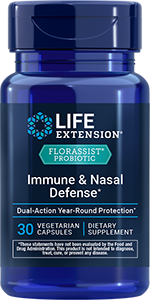
10 Spring Wellness Tips for a Fresh Start
Published: March 2025
There's something so motivating about spring's arrival—more sunlight, warmer temps and time outdoors make you want to hit the reset button on everything from exercise to what you slather on your skin. Spring is fresh with possibility, a season to reassess your health and reinvigorate your wellness routines—although you might benefit from some seasonal support supplements to get the most out of your time outside.
Here are 10 tips to get you excited and inspired for a fresh start:
1. Seasonal foods to enhance your diet
Spring is the perfect time to clean up your eating habits and diet. Local farmer's markets usually overflow with delicious in-season fruits and vegetables. Scope out spots near you and grab the rainbow of produce like cabbage, asparagus, rhubarb, apricots and strawberries. Consider researching spring recipes before you go to make the most of your trip.
At the farmer's market, be sure to stop at the local honey stand. A hint of raw honey in your smoothie or drizzled over yogurt not only tastes amazing but can help support your immune system against seasonal challenges, and it's an excellent alternative to refined sugar.
2. Types of outdoor exercises
Maybe winter zapped some of your fitness mojo, and you visited the couch more frequently than the gym. Or you're on the other end of the spectrum and worked out without fail. Either way, taking your exercise outside can do wonders for your health and well-being; workouts have been shown to help encourage your nervous system, cardiovascular and immune system health.
Want an easy way to get active outdoors? Start walking! It doesn't require expensive gear and can be done anytime. Alternately, take a workout you normally do indoors to the park or add a new class to your agenda. Search up outdoor yoga or Pilates or find an obstacle course or trail circuit in your area. Hiking and trail running are great options for getting in some outdoor cardio.
If you live near the water, grab a paddleboard or kayak, or hit the local pool for water aerobics or swim classes. Strap on your rollerblades or skates or hop on your bicycle to take advantage of spring weather in your neighborhood.
For extra motivation, set a training goal and invite some friends along for the ride (or paddle or walk) to get an extra boost from socializing.
3. Self-care practices to add to your wellness routine
Loving yourself has serious benefits. As you rethink your wellness routines this season, try incorporating these self-care practices:
- Breathwork: Paying attention to your breath through box breathing or 4-7-8 breathing can help you feel more relaxed and boost your mood, among other mental and physical benefits. Try taking your practice outside to boost the benefits.
- Mindfulness: Practicing present-moment awareness is a great way to appreciate the season and help yourself stay grounded and focused. Studies suggest that mindful habits support a healthy response to occasional stress.
- Learn new things: Spring is all about newness, and that can mean incorporating new classes (language, exercise), new recipes (with those in-season fruits and veggies) or new ways of socializing (meet-ups over crochet or coffee) into your routine. When you stay curious, your mind stays sharp.
- Dine al fresco with friends: Eating a meal with friends encourages social interaction, which is known to support longevity and healthy aging. You're also bound to laugh a little (or a lot), another plus for your overall mental health.
4. Spring supplements to jump-start your health
Revamp your whole-body health with supplements that support healthy aging and wellness. Here are some core nutrients to consider:
N-Acetyl-L-Cysteine (NAC).
This nutrient supports immune health, liver health and function and is considered a powerful antioxidant. NAC is a precursor to glutathione, an antioxidant in the body that protects cells from free radical damage.Vitamin D.
Yes, soaking up more of the sun's rays in spring will help your body create more vitamin D, but it may not be enough to feel the full benefits. Vitamin D3 is key to bone and immune health and has also been found to encourage brain function and heart health.Magnesium.
This powerhouse mineral is involved in over 300 biochemical reactions in the body—yet many people don't get enough magnesium. While it's been shown to support cardiovascular and bone health, it also promotes energy metabolism and brain function. Bananas, spinach, dark chocolate, avocados, and chia seeds contain magnesium, or a magnesium supplement can help fill dietary gaps.Omega-3s.
With warmer weather and outdoor exercise, it's important to pump up your intake of omega-3 fatty acids. Omega-3 supplements support healthy heart and blood vessel function, help maintain already-healthy blood pressure, support healthy cognitive function, and help inhibit inflammatory factors to support whole-body health.CoQ10.
CoQ10 is an essential nutrient for energy production and has powerful antioxidant properties. However, CoQ10 levels decline with age, so you'll want to eat more foods like fish, meat, nuts, and avocados, or consider taking a supplement to maintain healthy levels.Probiotics.
To support your spring lifestyle, trust your gut—and add probiotics to your daily mix. Research shows gut health is key to gastrointestinal health, immune system function, and metabolic health. A healthy gut microbiome supports whole-body health, and maintaining that microbiome through a healthy diet and supplementation is easier than ever.R-Lipoic Acid.
Want another way to supercharge your spring supplements? This cellular energy health support supplement uses the biologically active form of lipoic acid that has powerful antioxidant properties, which helps protect your body from oxidative stress.
5. Spring cleaning techniques
With spring comes cleaning (obviously), which is also excellent for wellness. Decluttering your home can help declutter your mind and provide a workout at the same time!
While an all-day spring cleaning does the trick, it's not the only way to clean. Consider focusing on one room per week. If that still feels unmanageable, focus on specific spots in your home. You could start with bathroom and kitchen cabinets, tossing out expired medicine and pantry items. Or give yourself a daily time limit—15 minutes each night or morning—to tidy up. Tacking this onto your schedule will help you establish a clean routine to last for the long haul.
6. Organizational hacks for your home
When you get organized, it pays off with benefits in stress management, quality sleep, and overall wellness. You can start small, using helpful hacks to get your house in order and keep it organized. Think about installing open shelving units in your bathroom and closets, using clear, stackable containers in your refrigerator, and labeling jars of small things (like snacks, craft supplies and toiletries). Take inventory of your space, noting places where it can do double-duty (such as installing hanging racks in the laundry, or using blanket bins in the living room). Small adjustments can make a huge difference.
Explore Our Best General Health & Wellness Supplements
7. Step up your spring routine
If you're looking for an easy way to hit your fitness goals, take it step by step—literally. Simply look for spots to fit extra steps into your daily routine. Sitting at your desk all day? Step outside at lunch and walk around the building. Instead of driving down to your mailbox, walk there and linger a little to breathe in the fresh air. After dinner, grab a family member (or your phone) and enjoy some good conversation while you circle the block. While walking itself encourages digestion, the conversation can help boost your mood.
8. Prioritize uninterrupted sleep
Athletes are notorious for putting sleep above all else, and for good reason. Sleep is your body's way of recharging itself, and quality sleep supports almost every aspect of health, from your mood and memory to your weight management and immune health. Embrace a bedtime that gives you seven to nine hours of sleep every night to function your best.
For your most restful sleep, keep your bedroom temp between ~65-70º F and completely dark (hello, blackout curtains). Be sure to cut out distractions like the TV, phone, or computer screens before bedtime, too. Establish and maintain a regular sleep schedule for a consistently good night of rest.
9. Revamp your skin care routine
With more time outside, you'll need to adjust your skin care routine. Take inventory of your skin care and toss expired products. To reduce bottles, try duo-purpose products like moisturizers and bronzers with SPF, serums with antioxidants, retinoids, and alpha hydroxy acids. Consider swapping out your heavier winter creams for lightweight lotions, add an exfoliant and a vitamin C serum, and opt for an oil-reducing cleanser. Of course, sunscreen is going to be an absolute, regardless of what you change.
Remember, drinking water is one of the simplest ways to replenish your skin. It's also smart to schedule an annual skin check with your dermatologist.
10. Explore biohacking
Another interesting way to refresh your spring routine is to explore biohacking. Try these self-experimentation practices designed to maximize your health and healthy aging.
Manage blood sugar levels.
To help maintain healthy blood sugar levels, try wearable technology. Continuous Glucose Monitoring (CGM) is a tech-savvy device about the size of a quarter that affixes to your arm and tracks your blood sugar levels in real-time. The data gathered by the monitor goes to an app to help you adjust things like sleep and diet that impact glucose.Put nutrigenomics on the menu.
Want to try a biohack that lets you play with your food? Try nutrigenomics, or the study of how the foods you eat influence gene behavior. Remember those in-season fruits and vegetables? Create flavorful combinations and monitor the impact on your health with each one.Monitor resting heart rate and heart rate variability.
For anyone other than an athlete, VO2 max might sound like a foreign language. The V in VO2 max stands for volume, while O2 stands for oxygen, and monitoring this data can help optimize your heart health. While the most accurate measurement of VO2 max happens in an exercise medicine lab, you can also use online tools like calculators to monitor and track it.Target your supplementation.
While supplements are important to fill in dietary gaps and help support healthy vitamin levels, biohackers use them to optimize their mental and physical wellness.Nourish cognitive function.
To support mental stamina, look for lithium, colostrinin or magnesium L-threonate in your supplements, nutrients that help promote brain health and cognitive function.Keep the beat on a healthy ticker.
Biohack your heart health with supplements containing arjuna bark extract, a nutrient that supports the heart muscles for cardiovascular endurance and blood-pumping capacity and helps reduce fatigue during exercise.Muscle up your lifespan.
There's a strong connection shown between muscle mass and longevity—it's no wonder biohackers target muscle maintenance to improve their health. Aside from toying with different types and durations of strength training, biohackers also play with muscle-strengthening supplements, such as branched-chain amino acids (BCAAs), a group of three essential amino acids (leucine, isoleucine and valine) found in high-protein foods.
No matter which of your wellness routines you renew, these tips can help you welcome spring with a fresh perspective.
Interested in supporting your immune health in the face of spring's seasonal challenges? Our health needs quiz offers personalized suggestions.
References
- Goodwill AM, Szoeke C. "A Systematic Review and Meta-Analysis of The Effect of Low Vitamin D on Cognition." J Am Geriatr Soc. October 2017. https://pubmed.ncbi.nlm.nih.gov/28758188/
- Gu J, Ming X. "The Influence of Living Conditions on Self-Rated Health: Evidence from China." Int J Environ Res Public Health. August 2021. https://pmc.ncbi.nlm.nih.gov/articles/PMC8431523/
- Gul S, Durante-Mangoni E. "Unraveling the Puzzle: Health Benefits of Probiotics-A Comprehensive Review." J Clin Med. March 2024. https://pubmed.ncbi.nlm.nih.gov/38592298/
- Harris WS, et al. "Blood n-3 fatty acid levels and total and cause-specific mortality from 17 prospective studies." Nat Commun. April 2021. https://pubmed.ncbi.nlm.nih.gov/33888689/
- Hernández-Camacho JD, et al. "Coenzyme Q10 Supplementation in Aging and Disease." Front Physiol. February 2018. https://pubmed.ncbi.nlm.nih.gov/29459830/
- Innes JK, Calder PC. "Marine Omega-3 (N-3) Fatty Acids for Cardiovascular Health: An Update for 2020." Int J Mol Sci. February 2020. https://pubmed.ncbi.nlm.nih.gov/32085487/
- Lungaro L, et al. "Clinical Efficacy of Probiotics for Allergic Rhinitis: Results of an Exploratory Randomized Controlled Trial." Nutrients. November 2024. https://pmc.ncbi.nlm.nih.gov/articles/PMC11644003/
- Mizuno K, et al. "Ubiquinol-10 Intake Is Effective in Relieving Mild Fatigue in Healthy Individuals." Nutrients. June 2020. https://www.mdpi.com/2072-6643/12/6/1640
- Tangvoraphonkchai K, Davenport A. "Magnesium and Cardiovascular Disease." Adv Chronic Kidney Dis. May 2018. https://pubmed.ncbi.nlm.nih.gov/29793664/
- Tenório MCDS, et al. "N-Acetylcysteine (NAC): Impacts on Human Health." Antioxidants (Basel). June 2021. https://pubmed.ncbi.nlm.nih.gov/34208683/
- Vink R. "Magnesium in the CNS: recent advances and developments. Magnes Res. March 2016. https://pubmed.ncbi.nlm.nih.gov/27829572/
- Yong PYA, et al. "The Potential use of Honey as a Remedy for Allergic Diseases: A Mini Review." Frontiers in Pharmacology. January 2021. https://www.researchgate.net/publication/348789996_The_Potential_use_of_Honey_as_a_Remedy_for_Allergic_Diseases_A_Mini_Review
- Zhang X, et al. "Effects of Magnesium Supplementation on Blood Pressure: A Meta-Analysis of Randomized Double-Blind Placebo-Controlled Trials." Hypertension. August 2016. https://pubmed.ncbi.nlm.nih.gov/27402922/
- Zhang X, et al. "Omega-3 Polyunsaturated Fatty Acids Intake and Blood Pressure: A Dose-Response Meta-Analysis of Randomized Controlled Trials." J Am Heart Assoc. June 2022. https://pubmed.ncbi.nlm.nih.gov/35647665/
- "Benefits of Physical Activity." CDC. April 2024. https://www.cdc.gov/physical-activity-basics/benefits/index.html
- "Nutrigenomics." National Cancer Institute. https://www.cancer.gov/publications/dictionaries/cancer-terms/def/nutrigenomics
- "Seasonal Produce Guide." U.S. Department of Agriculture. https://snaped.fns.usda.gov/resources/nutrition-education-materials/seasonal-produce-guide
Like what you read?
Please subscribe to get email updates on this blog.











